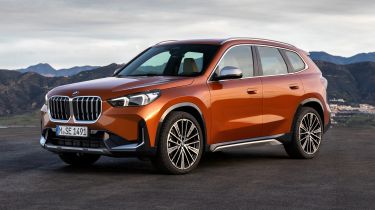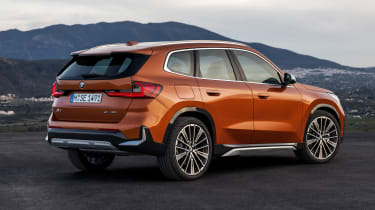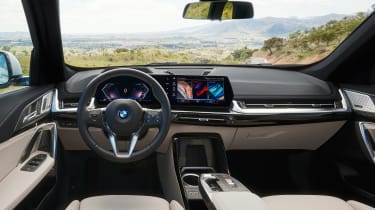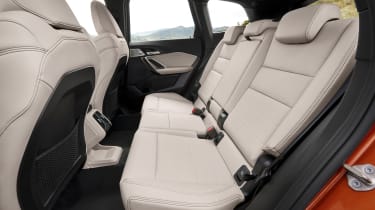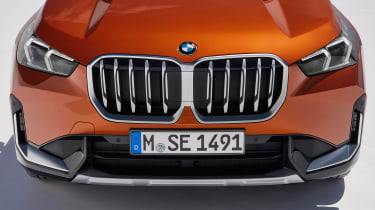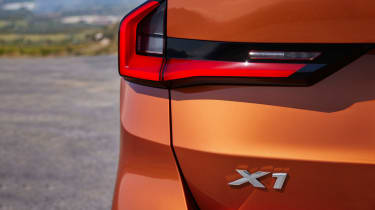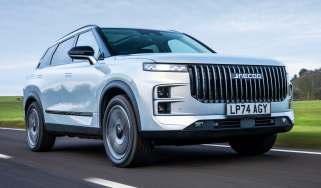New 2022 BMW X1 SUV has arrived
The latest generation of BMW’s smallest SUV gets the latest infotainment and plug-in hybrid tech
- New ‘Curved Display’ infotainment
- Petrol, diesel and plug-in hybrid powertrains
- On sale later in October
The second-generation BMW X1 made its debut in 2015 and has since started to feel outdated compared to competition from its mainstream rivals. BMW seeks to change this as the Munich-based brand has unveiled the third generation of X1, featuring the brand’s latest iDrive OS 8 technology and an electrified engine range.
 The best luxury small cars to buy in 2025
The best luxury small cars to buy in 2025
Full pricing for the all-new BMW X1 has yet to be revealed, but we expect it to cost slightly more than the outgoing model when it goes on sale in October. Alongside a range of engines, buyers can choose from five different specifications: Sport Premier, xLine, xLine Premier Pro, M Sport and finally, M Sport Premier Pro. Mid-spec petrol cars are expected to start from around £35,000, while BMW has confirmed a top-of-the-range M Sport Premier Pro diesel model will cost £46,660. Unfortunately, BMW is yet to divulge any details when it comes to the pricing of the plug-in hybrid models.
Compact family SUVs are a hot commodity right now, with the sector flooded with competition. BMW hopes the new X1 will be able to hold its own against the likes of the Audi Q3 and Volvo XC40, as well as less premium offerings such as the Skoda Karoq and Nissan Qashqai.
2022 BMW X1 SUV: design and exterior
Untrained eyes may struggle to see what has changed on the outside from the previous generation of X1. The BMW X1 has historically taken a more traditional approach to SUV design, with more rugged styling than the sleek and swooping lines seen in the equivalent Mercedes GLA. This latest model is no different; the new X1 gets off-road inspired body cladding as well as roof bars to give off a larger, more imposing presence. Cars specified in xLine trim also benefit from lifestyle-oriented pieces such as a faux skid plate at the front and matching rubbing strips along the side.
That’s not to say there haven’t been any significant changes, however; the new X1 gets a slimmer set of LED headlights, reminiscent of those seen in the newly-facelifted BMW 3 Series. These can be upgraded to adaptive units and flank the X1’s kidney grille, which has also marginally grown in size. Thankfully, its front air-intakes still aren’t quite as flared as those on larger BMW models such as the X7.
Buyers will be able to customise their X1 with a variety of paint and alloy wheel options. There are 10 metallic paints to choose from, plus wheel sizes that range from 17-20 inches in diameter. Like before, the X1 can be specified with a gloss-black styling pack which darkens several of the chrome and aluminium exterior elements.
Interior and technology
More radical changes can be found on the inside as all X1 models feature BMW’s latest iDrive OS 8 infotainment system. This utilises the ‘curved display’ setup that first appeared on the BMW iX electric SUV, consisting of a 10.25-inch central infotainment screen, alongside a 10.7-inch digital instrument cluster. The former functions as a touchscreen and comes as standard with built-in satnav and Apple CarPlay connectivity.
Elsewhere, the interior design of the X1 somewhat mirrors that of the new BMW 2 Series Active Tourer. There is a large cubby box underneath the centre console which can be specified to house a wireless charger for your mobile phone and there are very few physical buttons. Unfortunately, there are no physical climate control dials either, meaning drivers will frustratingly have to venture into the infotainment system each time they wish to adjust the air conditioning.
The BMW X1 has grown in size for this third generation model, which means it should be more practical for families. The wheelbase (the distance between the front and rear wheels) has expanded by 20mm, with a 50mm growth overall. It’s also slightly wider – by 24mm to be exact – all of which should come as a benefit to passenger and boot space. The X1’s boot offers an impressive 540 litres of room, which is slightly more than what is found in an Audi Q3. Plug-in hybrid versions of the X1 have slightly less space to work with at 490 litres, as the area under the boot floor is used to house one of the car’s electric motors.
As standard, the new BMW X1 comes with a range of safety and driver assistance systems such as forward collision warning, lane departure warning, collision avoidance, traffic sign recognition and cruise control. If you intend to do long journeys frequently, BMW also offers an optional Driving Assistant package; this includes lane keep assist, rear cross traffic alert and blind spot monitoring. The even more comprehensive Driving Assistant Plus and Professional packages also add varying levels of semi-autonomous driving capability.
Engines and powertrains
As before, the X1 sits on BMW Group’s UKL2 underpinnings, which it also shares with the smaller 1 Series hatchback and several models from the MINI range. However, it has been modified for this generation in order to accommodate a fully-electric powertrain. Dubbed the iX1, this all-new model features a 272-mile electric range and you can read all about it here.
There are now also two different plug-in hybrid variants on offer. The entry-level PHEV is called the xDrive25e and produces 242bhp, whereas the xDrive30e has a greater 322bhp at its disposal. Both models utilise a three-cylinder petrol engine, paired with an electric motor; this gives them xDrive all-wheel-drive and provides a class-leading electric range of 55 miles.
Of course, if you’d rather a more traditional powertrain, the X1 will oblige with its range of petrol and diesel offerings. There are two petrol engines to choose from: an entry-level three-cylinder and a larger four-cylinder mild hybrid. The former – dubbed the sDrive18i – produces 134bhp at the front wheels, which allows for a 0-62mph in 9.4 seconds and up-to 45mpg. The more powerful four-cylinder xDrive23i gets all-wheel-drive and produces 201bhp. Here, 0-62mph takes just 7.1 seconds and drivers can expect fuel economy figures of up-to 43mpg.
Those planning to cover a lot of miles will likely be best opting for one of the two diesel models. The least-powerful of the two is called the sDrive18d and uses a 148bhp four-cylinder engine. This can do 0-62mph in 8.9 seconds and returns a frugal 57.7mpg. Just like the petrol, the more powerful diesel gets a mild-hybrid system and all-wheel-drive, but this time produces 194bhp. BMW claims the sprint from 0-62mph will take 7.4 seconds and that the xDrive23d will manage up to 58.9mpg.
What does this mean for car buyers?
The car industry is going through a huge transition at the moment; all cars must be electrified by 2030, a time when BMW thinks one in every two of its cars will be without a combustion engine at all. While it seems some manufacturers are putting all their eggs in one electrical basket, BMW continues to offer a wide range of powertrains to suit whatever position buyers may be in during the switch to electric. Given its wide range of appeal, we expect the X1 to be popular for the German brand, however its success will likely rely upon competitive pricing and finance deals, as this is where more mainstream rivals tend to flourish.
Looking for something with a bit more space? Check out our list of the best medium and family-sized SUVs
Recommended

New Subaru Trailseeker revealed as rugged electric SUV with 375bhp

New Subaru Solterra brings more range, power and polish
Most Popular

Omoda E5 targets rivals: now with zero deposit and APR
Tips & advice

Car dashboard warning lights: what does each symbol mean?

Electric car charging stations: public networks, charger types, apps and maps


